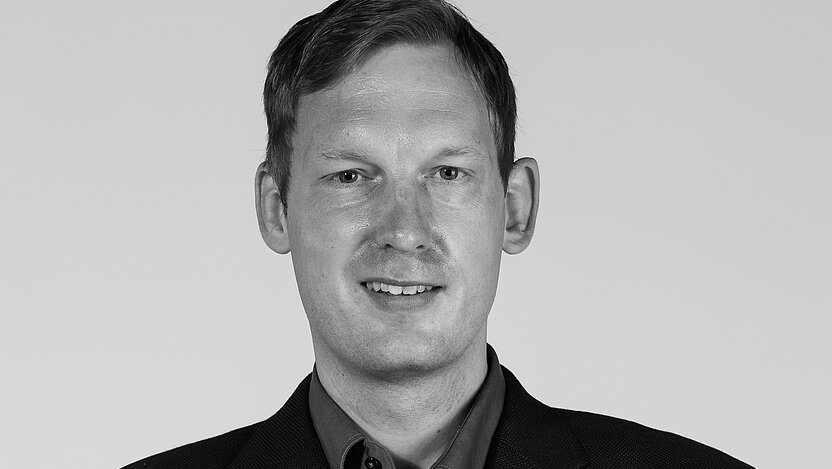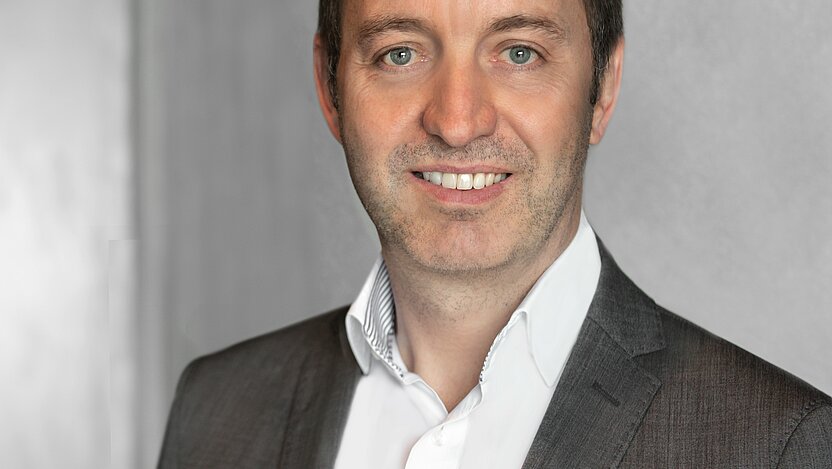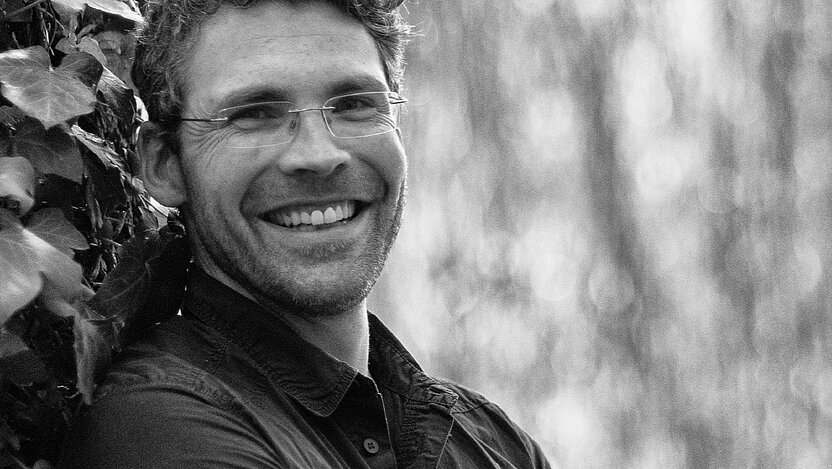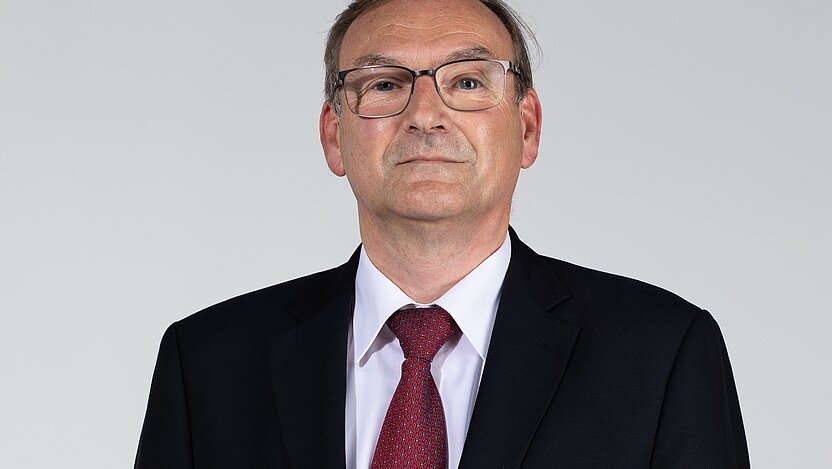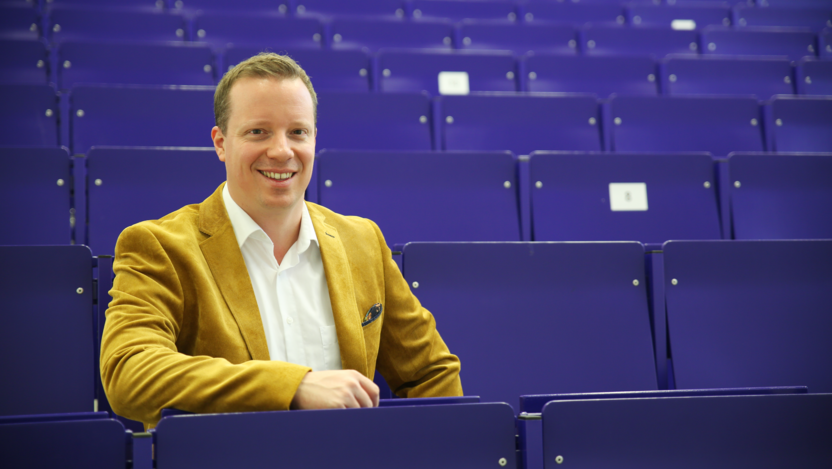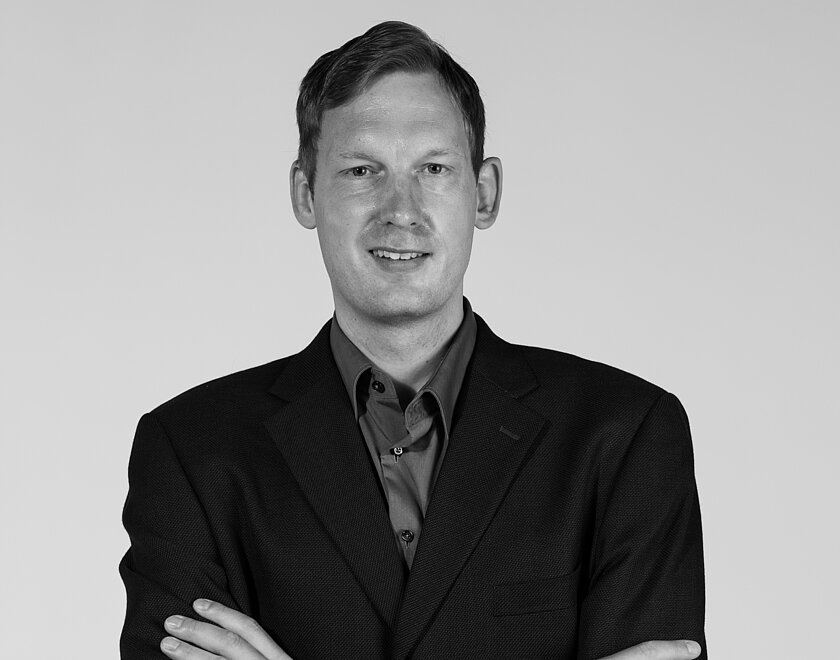
Prof. Dr. Stefan Faußer
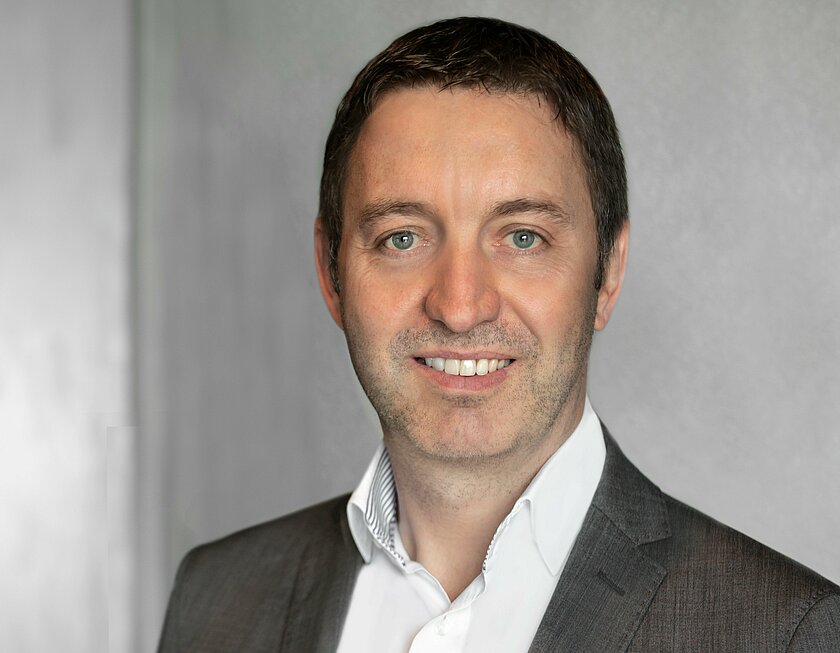
Prof. Dr. Jürgen Grinninger
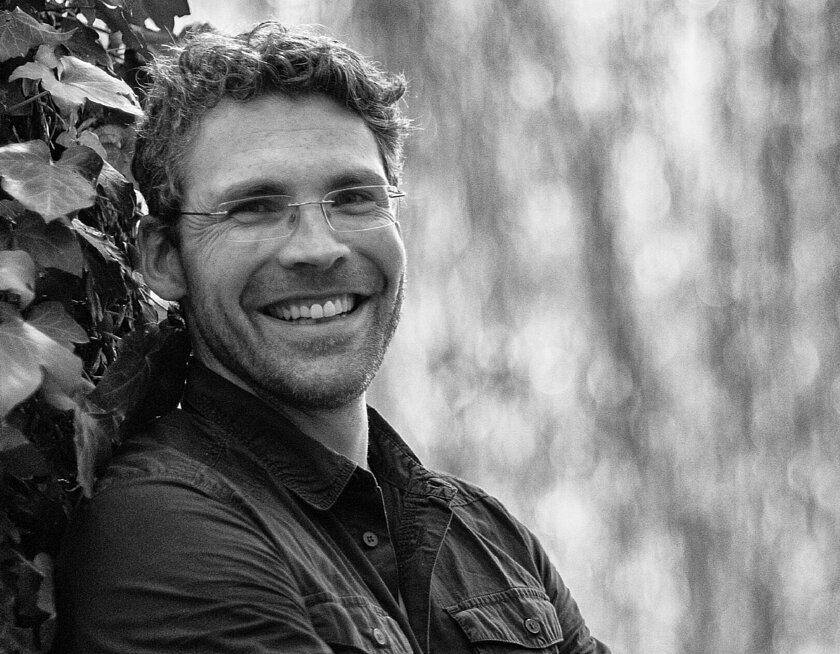
Prof. Dr. Michael Hebel
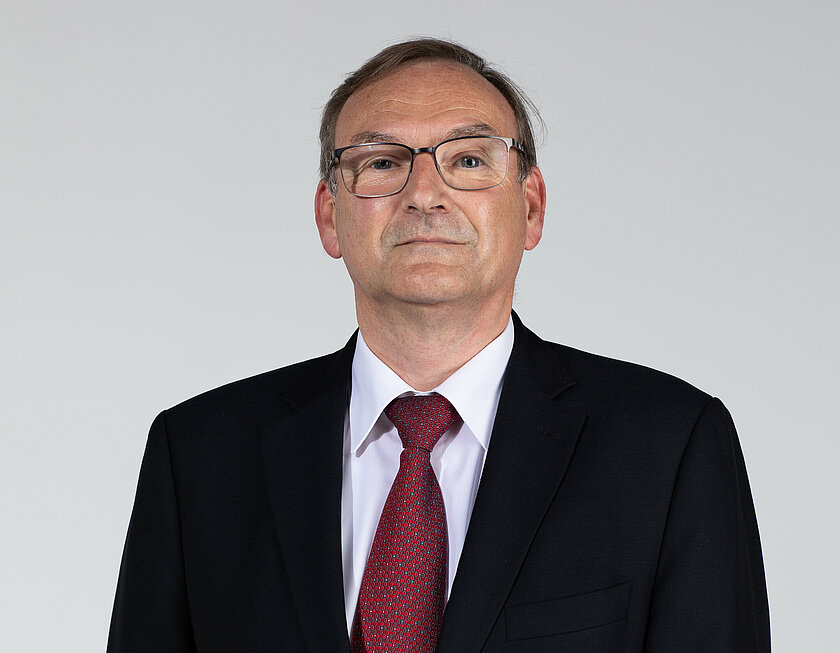
Prof. Dr. Heinz-Theo Wagner

Prof. Dr. Stefan Weber
Prof. Dr. Stefan Faußer
Will you tell us something about your career so far?
Before my professorship for Data Analytics at HNU I worked at WMF in the field of professional coffee machines. As a data scientist I had the exciting task of evaluating the data of coffee machines, which are also Internet Of Things (IoT) devices, in order to answer important business questions for the corporate environment. The management of resources such as analytics service providers, who had helped build the data platform, was one of my tasks. Before that I worked for TeamViewer and Real-Time Systems GmbH. All in all, I have more than 12 years of professional experience as a data scientist and software engineer since my master's degree in computer science from the University of Ulm. Before my master I had studied computer science at the University of Applied Sciences in Ravensburg-Weingarten. The two courses of study had formed me differently and I would not want to miss any of them. After my master's degree, I had done my doctorate in Machine Learning at the Institute of Neuroinformatics at the University of Ulm. That was an exciting time, during which I not only wrote my dissertation, but was also allowed to publish scientific articles in journals and conference proceedings. In my PhD thesis I had done research on reinforcement learning ensembles and methods for the formation of non-spherical clusters from large amounts of data. The first topic can be expressed in a simplified way: I had dealt with self-learning machines that learned through a reward system to solve a problem better and better, e.g. in the games Tetris and checkers. Better results could be derived from the decisions of several of the self-learning machines than from the decision of a single self-learning machine.
What brought you exactely to Neu-Ulm and HNU?
I really appreciated the profile of HNU with a mixture of business and technology / theory. In business, pure methodological knowledge is not enough, you have to be able to apply it profitably. Furthermore I have the possibility to build up a study program at the HNU. I don't think I can give away the name and the direction yet, but it will complement the existing study program.
How were your first months at HNU?
I was warmly welcomed by my colleagues and my many questions were answered in a friendly manner. Enclosed a heartfelt thank you to all of you. Apart from that, the first months were quite turbulent, on the one hand because of the corona restrictions, on the other hand I had many new lectures to prepare and hold, seminar papers and master theses to discuss and to help shape study programs. My best moments were interested questions in my lectures, which I am happy to answer.
Why did you become a professor?
Durch Lehraufträge an der Hochschule Ravensburg-Weingarten, der Technischen Hochschule Ulm und die Leitung einiger Tutorien an der Universität in Ulm hatte ich bereits frühzeitig für mich festgestellt, dass die Weitergabe von Wissen nicht nur eine Aufgabe ist. Es reizt mich, die Neugier der Studierenden an Wissen zu stärken, damit dieses später in der Wirtschaft oder im akademischen Umfeld Anwendung findet. Meiner eigenen Begeisterung und Neugierde kann ich in der Forschung nachgehen. In der Lehre und in der Forschung habe ich viel Eigenverantwortung, die ich ebenfalls sehr schätze.
What are the focal points of your research and teaching?
My basic research and focus is in the areas of machine learning, big data, natural language processing and general data science. The lectures I give contain at least one of the above mentioned topics. In the future, I could imagine further lectures in these areas at HNU. Two questions are of particular interest to me in the field of research. First: How can AI be used profitably in companies? Trends include IoT devices, predictive maintenance, sentiment analysis, customer segmentation and explainable AI solutions. The second question that I find exciting is: How can an AI that has learned to solve a specific problem solve other similar problems?
What can be learned in your lectures?
In my lectures you learn to use the AI "Black Box" as well as to understand it fundamentally. Easy to use tools tempt you to get results that cannot be understood or explained properly. With the basic understanding I provide, students should be able to understand and use future AI methods more easily.
What do you like to do most when you are not teaching and/or researching at HNU?
Yoga, swimming, reading books, building electronic gadgets like robots and programming Raspberry Pi's and spending time with my wife and kids.
Either/or
(vegetarian) Sushi or Spaetzle?But please not together.
Camping or Hotel?Private: camping, professional: hotel
Book or film?In exactly this order.
Allgäu Alps or Lake Constance? First Lake Constance and then the Alps.
Coffee or tea? Both.
Bicycle or car? Public transport
Sofa or armchair?
Bits of paper everywhere or digital notebook? Mostly the latter, sometimes the former.
Forest walk or city trip?
Personal details
My area of expertise in three words:
... is Data Analytics
HNU is:
... a place for innovative minds, a business incubator and a place for teaching and research
This is the sentence I like to hear best from my students:
"I have a question about that"
Current reading:
Thinking, Fast and Slow. I have started the book several times and would like to finally understand it in detail
My next publiction/project ...
... is scientific cooperation with my colleagues
Always on my desk:
At the moment it is still pretty empty. However, I would like to have plants on my desk equipped with temperature and humidity sensors as an example for IoT Device
The first thing I do in the morning at my workplace:
Checking e-mails, drinking coffee, checking my work list
Prof. Dr. Jürgen Grinninger
Will you tell us something about your career so far?
I studied Industrial Engineering and Management at the University of Applied Sciences Würzburg-Schweinfurt, so I know the operation of a university of applied sciences (at that time still simply a university of applied sciences) also from the student side – although I am very happy that a lot has changed here. Already during my studies I joined the Ford Motor Company in Dagenham (UK) as a carline engineer in 1997. After my first professional experience abroad, I was able to get to know the passion for production and logistics in various professional positions in supply chain management at Audi AG at German and foreign locations. The construction of a new automobile plant in Eastern Europe was certainly a highlight here – both in terms of technical expertise and project management. In 2004, I decided to do my doctorate - which was not really easy at the time as an FH graduate. In addition to an industrial research project "Stabilization of order sequences in automotive variant flow production", my doctoral thesis topic, I was also allowed to set up my own company, BLSG AG, a management consultancy for Operations Excellence and Supply Chain Management, where I was a member of the board for the last 16 years.
What brought you exactely to Neu-Ulm and HNU?
What was decisive for me was the clear focus of the university on future technologies, based on a profound basic education for students - in my opinion a good basis for a successful start in professional life. I also find it remarkable how many opportunities the HNU offers teachers and of course students, especially in the area of digital teaching. And I found it exciting to be able to help shape the Systems Engineering joint degree program in blended learning format.
How were your first months at HNU?
I have been warmly welcomed by all my colleagues at HNU and have been offered help in every situation. Thanks to my colleague Tobias Engel, I also landed softly in teaching. I was able to take away many valuable tips for the first steps in blended learning. Thanks to the good preparatory work for many of the lectures, getting started couldn't have been easier.
Why did you become a professor?
A teaching position at the TH Ingolstadt for the last three years has shown me how much fun and pleasure I have in working with young people and at the same time sharing the knowledge and experience in the field in a practical way. I am also looking forward to the creative possibilities in teaching and research of such an interdisciplinary faculty, as is the case in information management.
What are the focal points of your research and teaching?
My passion is project and supply chain management. The planning of complex global value networks and smart factories is a fascinating thing. To design these supply processes adaptively and resiliently is still a challenge. We usually only notice this when something doesn't work as it should (e.g. an Internet order cannot be delivered in two days or toilet paper is no longer available in the supermarket).
In teaching, we combine the basics of production and logistics with the application of new technologies in the context of IoT/Industry 4.0.
What can be learned in your lectures?
In my current lecture series you will get an overview of the field of project management. What is important when designing projects? How do you manage and organize a project, no matter if it's building a house or relaunching an app? In addition to theory, my students learn how to apply it in their own real project - from project plan to risk management - everything necessary to achieve the project goals.
What do you like to do most when you are not teaching and/or researching at HNU?
Soccer has been my passion since childhood – I teach this passion to children aged 4-12 years as a coach. And if there is time, I like to kick the round leather myself.
Personal details
My field of expertise in three words:
... Supply Chain Management
HNU is:
... an innovative, exciting place
This sentence I like to hear best from my students:
"Can I write my bachelor's thesis at your school?"
Current reading:
"Fast thinking, slow thinking" by Daniel Kahnemann
My next project/publication ...
... Robotic Process Automation in Supply Chain Management
Always on my desk:
A bottle of still water – nothing else! I am a friend of 5S, a lean method based on a Japanese philosophy of order and cleanliness
The first thing I do in the morning at my workplace:
My task list in Outlook to prioritize (or delegate) the tasks of the day
Either/or
Sushi or spaetzle?
Camping or hotel?
Book or film?
Allgäu Alps oder Lake Constance? South Tyrolean Alps
Coffee or tea? Espresso (nur aus der Siebträgermaschine)
Fahrrad oder Auto? Both has its purpose
Sofa or armchair?
Bits of paper everywhere or digital notebook?
Forest walk or city trip? Forest, forest, forest... Best in my home region.
Prof. Michael Hebel
Will you tell us something about your career so far?
I had the pleasure to study media design at the University of Applied Sciences Augsburg with a focus on 3D design and photography. Originally, I wanted to work as a 3D animator at Pixar, but then switched to game design. This can be seen in the topic of my diploma thesis, a modification for the Unreal Engine, and the choice of my master's degree in Game Development. In 2008 I was allowed to make my dream come true and start my career in the games industry as a 3D artist at Ubisoft Studio Mainz, where I worked on the Anno series, among others. Besides, the university world never let go of me completely, because I was busy teaching. At some point I simply changed from my two mainstays to one, namely university teaching. In Heidelberg I consolidated my teaching concept and research interest and since this winter semester I'm allowed to come back to Bavaria to teach at HNU and hopefully make a big difference in the field of games.
What brought you exactely to Neu-Ulm and HNU?
I spent a large part of my childhood and then my student days in Bavaria. I feel comfortable here. The HNU has expressed a declaration of intent with the GPM course of studies, which I would like to not only support but also to continue to lead. I see great potential here to further develop myself as well as the game teaching.
How were your first months at HNU?
The first weeks were quite turbulent. Not only am I confronted with a gigantic number of game-enthusiastic students, but also with the challenge of digital teaching. As is well known, design is taught in small groups on a project and presence basis. However, I think we have found each other quite well and are making the best of the situation. I see the change in teaching as an opportunity to try out sensible e-learning formats and to bring them into line with game didactics.
Why did you become a professor?
At school I enjoyed teaching for a long time, but I did not want to become a teacher. I was more interested in adult education, whether in sports or design. What I like about being a professor is the independent work between teaching and research, which on the one hand meets my inclination to convince students of my passion (i.e. the game topic) and to accompany them on this exciting path, and on the other hand my insatiable curiosity and enthusiasm to learn new things. I regard my students as an extended family. With them I can carry out great projects and have a good time.
What are the focal points of your research and teaching?
I mainly teach Game Design, Game Art and Game Producing. Since game(-design) as an emerging discipline is a cross-sectional discipline analogous to design, it is difficult for me to commit myself to single topics. Currently, I am interested in canon formation in game history, a field of game didactics in which I am doing research and publishing. I am interested in establishing a national game didactics program in cooperation with other universities and the game association. In the long term, I hope that game design will become an independent scientific discipline with the right to award doctorates. There is still much to be done to achieve this. The dream of a holistic game university is what I paint in my papers and lectures.
What can be learned in your lectures?
I try to teach students the development process of games in a holistic and practical way. It's not so much about the craft of design, which is of course important, but rather about the design action, the responsibility of each designer and the potential we have to advance the discipline.
What do you like to do most when you are not teaching and/or researching at HNU?
I prefer to spend time with my three children, which takes up most of my time. If there are a few gaps left, I climb in walls or climbing ropes courses, strumming my guitars or preparing for a long awaited horseback riding vacation in Scotland to explore the country, its people and distilleries.
Personal Details
My field of expertise in three words:
... Games, Game Design, Game-Studies (playing, making games, studying games)
HNU is:
... appeared on the scene at the right time with a study program for Game Production and Management
This is the sentence I like to hear best from my students:
"It was exhausting, but awesome"
Current reading:
Besides the professional reading I am currently reading the novel "Die letzte Praline" by Carsten Sebastian-Henn
My next publication/project will be ...
... Canon formation in game didactics. What game students need to know about game history - an educational policy decision for Germany as a game location
Always on my desk:
Coffee
The first thing I do in the morning at my workplace:
Browse through my trade journal
Either/or
Sushi oder spaetzle? Both are delicious.
Camping or hotel? I'm a little spoiled.
Book or film?
Coffee or tea?
Bicycle or car?
Sofa or armchair?
Bits of paper everywhere or digital notebook?
Prof. Dr. Heinz-Theo Wagner
Will you tell us something about your career so far?
After studying economic geography at the Justus Liebig University in Gießen and operations research at the RWTH Aachen, I started a long career at Siemens AG, which led me to various specialist and management positions and to various locations. While working on my doctoral thesis on Business-IT Alignment at the E-Finance Lab of the Johann Wolfgang Goethe University in Frankfurt am Main, I worked for several years as Operations Director in a medium-sized company in the aviation industry. Subsequently, I began a career as Professor of Management and Innovation at the German Graduate School of Management and Law (GGS) in Heilbronn, where I focused my teaching and research on the areas of value contribution through information technology, strategic IT management and innovation management, which also included the diverse involvement of the mostly technology-oriented medium-sized companies.
What brought you exactely to Neu-Ulm and HNU?
The chance to establish a new course of study that lies at the core of my teaching and research interests – Digital Innovation Management –, the collaboration with interesting colleagues, both existing and new, and the pleasant atmosphere. I also like the fact that the region offers many opportunities for cooperation with companies.
How were your first months at HNU?
Given the current restrictions imposed by the pandemic, many contacts had to be made digitally. Despite these restrictions, my first weeks at HNU were characterized by the warm welcome I received from many colleagues, who always helped me with questions in a friendly manner. I also very much appreciate the support I received in getting started with the various tools in online teaching and the administrative processes at HNU. In the meantime, I have been able to meet many colleagues and students - even if mostly digitally - and I hope that in the course of the coming year more personal contact will be possible again.
Why did you become a professor?
Teaching and research have always fascinated me. As a professor, I appreciate the triad of continuing to build and research where others have stopped, awakening curiosity for knowledge and connecting the "why" of theory with the "how" of practice.
What are the focal points of your reasearch and teaching?
My research deals with the creation and design of digital innovations - a core task of companies that serves to stand out from the competition by providing services that inspire customers.
Digital innovation is at the top of the agenda both in science and in practice because it has far-reaching consequences for companies and for society as a whole. Therefore, the goal of my research is to understand which combination of factors have a positive or negative impact on digital innovation and how appropriate control measures can be derived. Accordingly, teaching is also concerned with understanding and shaping digital innovation.
What can be learned in your lectures?
My current courses deal, for example, with the design and creation of services as well as the systematic application of research methods and the structured processing of initially fuzzy problems, such as the topics of master theses.
Future events on Digital Innovation Management will focus on how the new comes into the world, how the digital in it changes the world and how you can shape it.
What do you like to do most when you are not teaching and/or researching at HNU?
Go hiking.
Personal details
My field of expertise in three words:
... shaping digital innovation
HNU is:
... my anchor point for research and teaching
This is the sentence I like to hear best from my students:
"Can I hear more on this subject?"
Current reading:
The Founder's Mentality by Zook and Allen
My next publication/project will be ...
... Digital resilience in times of Corona
The first thing I do in the morning at my workplace:
Drink coffee and check to to-do list for the day
Either/or
Sushi or spaetzle?
Camping or hotel?
Book or film?
Allgäu Alps oder Lake Constance?
Kaffee oder Tee?
Fahrrad oder Auto? For short distances: walking, for long distances: car
Sofa or armchair?
Bits of paper everywhere oder digital notebook?
Forest walk oder city trip?
Prof. Dr. Stefan Weber
Will you tell us something about your career so far?
After my studies in Karlsruhe and Tübingen, I received my doctorate at the University of Tübingen with a cumulative dissertation on model-theoretical and empirical burden and decision effects of VAT. The core of this thesis was to use statistical methods to show the extent to which tariff changes in value-added tax are passed on to consumers. This is a topic that, as is well known, has gained renewed attention during the Corona crisis.
Prior to my appointment as professor at HNU, I worked for a large Stuttgart car manufacturer and was responsible for tax issues in India, Japan, Australia, New Zealand and Singapore as well as for the taxation of digital business models. I am now happy to bring the experience I gained there to my lectures.
What brought you exactely to Neu-Ulm and HNU?
With its premises, website and social media presence, HNU has a very modern appearance as a university. I find the equipment of the HNU, e.g. in the lecture halls and the library, very good, which has a positive effect on teaching and research. Furthermore, I have the feeling that students at HNU are offered something in addition to the academic curriculum that will help them in their entry into professional life.
How were your first months at HNU?
The first few weeks and months at HNU have been a very good and fulfilling time for me, apart from the corona restrictions that eventually affect all of us. I was impressed by the diverse and stable running e-learning tools. I was also able to meet some of my colleagues personally, who without exception were very helpful in helping me get started at HNU.
Why did you become a professor?
During my studies and my doctorate at the University of Tübingen I worked with Prof. Dr. Dr. h.c. Franz W. Wagner, I developed my strong interest in business taxation. As unpleasant as taxes are when you have to pay them, it is on the other hand interesting to deal with them scientifically and in university teaching. Taxes influence people's decisions every day: Marriages are at least occasionally entered into (also) for tax reasons, the reunification of the former East Germany was largely due to tax investment incentives, companies make the decision between equity and debt capital dependent on the applicable tax rules, to name just a few examples. I became a professor in order to be able to deal with these exciting questions professionally. In professional practice outside the university, there is very little room for this. I would now like to pass on my enthusiasm for taxation to our students.
What are the focal points of your research and teaching?
In my teaching I represent the business tax theory and accounting. Scientifically, I deal with the decision effects of taxes, i.e. the question of how far taxes distort microeconomic decisions, such as investment alternatives, financing or choice of legal form or forms of remuneration.
What can be learned in your lectures?
Perhaps surprisingly for many readers, it can be observed that control systems around the world are constructed very similarly. The reason for this is that most tax regulations could not be regulated in any other way, as this would otherwise open the floodgates to unwanted tax evasion, for example. So one could almost claim that taxation worldwide follows certain "laws of nature". Therefore, students learn with me not only how a certain tax regulation is regulated, but also, whenever possible, why it had to be regulated in this way. My students do not expect to learn a bunch of paragraphs by heart, but a basic understanding of the construction principles of tax systems and their effects on economic decisions.
What do you like to do most when you are not teaching and/or researching at HNU?
Enjoying nature by bike or on foot, playing tennis, spending as much time as possible with family and friends, traveling, good food and keeping myself busy with wine.
Personal details
My field of expertise in three words:
... Taxes matter
HNU is:
... modern, innovative, international and a good place to teach, learn and research
Diesen Satz höre von meinen Studierenden am liebsten:
"I have one more question"
Current reading:
„Die Donnerstage des Oberstaatsanwalts“ by Herbert Rosendorfer
My next project/publication ...
Private: birth of our daughter, house, wedding (chronological order 😉)
Professional: Establish and expand cooperation with foreign universities in the field of taxation and publish a scientific paper on the decision-making effects of taxation in conflict resolution with environmental authorities
Always on my desk:
A little plush chimp
The first thing I do in the morning at my workplace:
Check my e-mail account for new e-mails
Either/or
Sushi or spaetzle?
Camping or hotel?
Book or film?
Allgäu Alps or Lake Constance?
Coffee or tea?
Bicycle or car? (in the spare time: bicycle)
Sofa or armchair?
Bits of paper everywhere or digital notebook?
Forest walk oder city trip?
[Translate to English:]
[Translate to English:]

